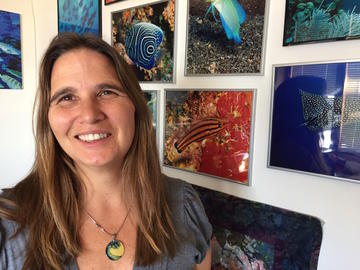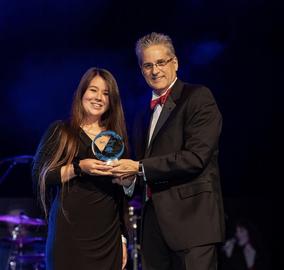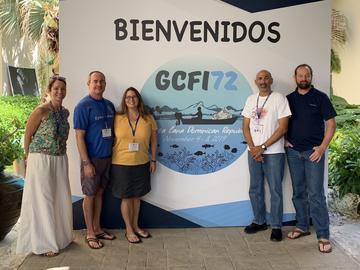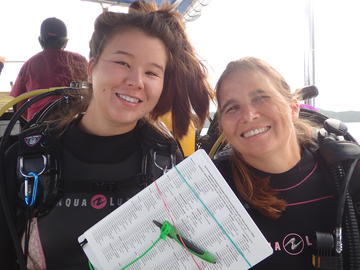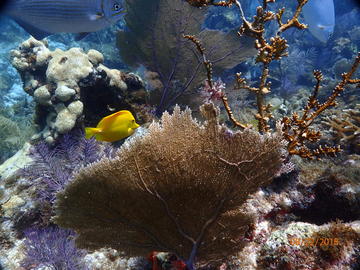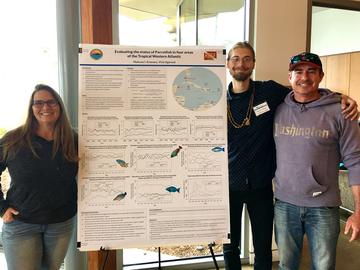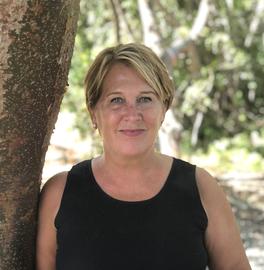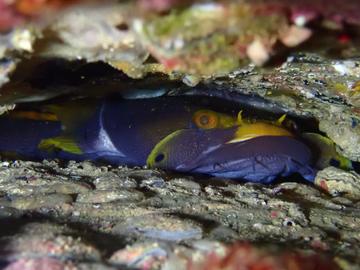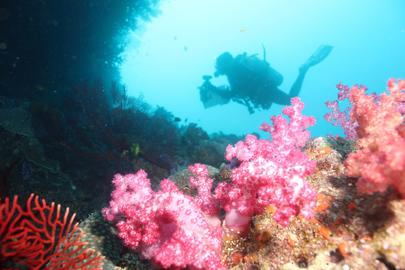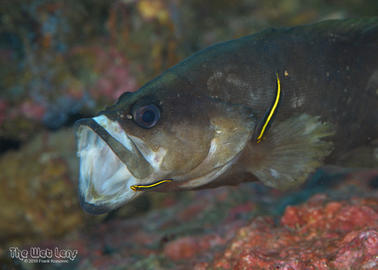REEF's Director of Science, Dr. Christy Pattengill-Semmens, was voted on to the Board of Directors of the Gulf and Caribbean Fisheries Institute (GCFI) at the GCFI Conference earlier this month.
We are excited to share that REEF’s Amy Lee was awarded the Diving Equipment & Marketing Association (DEMA)'s Wave Makers award for 2019 last weekend at the DEMA Show in Orlando, Florida. She was selected for this early career award for the impact she is having through conservation and education initiatives in the dive industry. Amy is REEF’s Trips Program and Communications Manager and has been part of our staff team since 2015. Through all aspects of her work, Amy strives to merge her passions for diving, communication, science, and travel.
REEF staff and partners just returned from the annual Gulf and Caribbean Fisheries Institute (GCFI) conference, held this year in the Dominican Republic. REEF’s programs and data were represented to the GCFI community by REEF Director of Science, Christy Pattengill-Semmens, and REEF Invasive Species Program Manager, Alli Candelmo, as well as our partners from Scripps Institute of Oceanography (Brice Semmens), Oregon State University (Scott and Selina Heppell), and Cayman Island Department of Environment (Bradley Johnson).
We are excited to share that Amy Lee has been selected by the Diving Equipment & Marketing Association (DEMA) Awards Committee as one of four finalists for the 2019 DEMA Wave Makers Award, an early career award for those making an impact in the diving industry.
A new paper was recently published in the scientific journal, BioInvasions Records, that provides an updated look at non-native marine fishes that have been reported from Florida waters through REEF's Non-Native Species Reporting Program and other sources. The paper also provides information on Early-detection/Rapid-response (ED/RR) efforts. In addition to the well-known invasion of non-native lionfish (Pterois volitans and P. miles), there are now 39 other non-native marine fishes that have been documented in Florida.
Herbivores play a critical role in balancing coral reef ecosystems. In the Caribbean, this role is mostly filled by parrotfish, surgeonfish, and sea urchins. Parrotfish take their important role one step further in that their constant scraping of algae growing on rock and dead coral results in a lot of poop, which is effectively the nice white sand found on beaches. A single parrotfish can generate up to 700 pounds of sand a year. Parrotfish are also a favorite food fish, and unfortunately their populations have been heavily depleted in many areas.
Caroly Shumway has left REEF after serving as its Executive Director to pursue opportunities related to addressing climate change. While at REEF, she helped advance our strategic partnerships, scientific applications of our programs, and our financial and regulatory procedures. We are grateful for her contributions to the organization. Caroly remains a committed conservationist, and we wish her well in her future endeavors.
The Volunteer Fish Survey Project is REEF’s cornerstone citizen science program, and was the foundation of the organization’s inception. The goal of the program is to enlist divers and snorkelers to report fishes they see during their time in the water; documenting status and trends much in the way birdwatchers do for birds. The first REEF surveys were conducted in 1993 by a few dozen volunteers in the waters off Key Largo, Florida. The program has grown significantly, with more than 16,000 volunteers participating and 230,000 REEF surveys conducted at sites around the world.
We are excited to share details of two recent scientific publications that leverage the long time-series of species composition information that our citizen science surveys provide. The first study looked at how reef fish community assemblages have changed over time at several sites in Florida. In particular, the researchers looked for evidence of biological homogenization (increasing species similarity between sites.) Homogenization can alter the ecological function of systems as well as the economic value associated with ecosystems. Dr.
A recent paper in Journal of the Ocean Science Foundation describes cleaning behavior that had previously not been documented in a particular species. The findings are the result of the keen eyes of two active REEF surveyors – Carol Cox and Frank Krasovec. Carol frequently surveys in the northern Gulf of Mexico and Frank surveys in his home state of North Carolina. Both photographed Yellowprow Goby, Elacatinus xanthiprora, cleaning other fishes, which is not typical for the species. Scientist and frequent REEF advisor, Dr.

